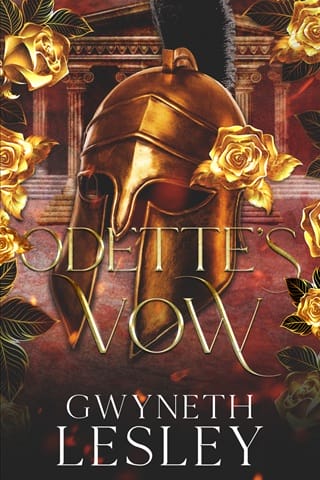10. Odette
10
Odette
O dysseus had returned under the cover of darkness, his face grim, his armour stained with blood. I did not know whose; I did not want to ask. But though there was no triumph in his steps, only the weariness of a warrior who knew the cost of his actions, it became clear as he wiped himself with a damp rag that the blood was not his own, and I returned to sleep.
My sleep was fitful at best, my dreams haunted as they always were by Alcander and Lykas. Though, more recently, only Lykas had been appearing. I had gotten used to his presence, the lingering melancholy that shrouded me as I woke, how it shook itself off now without my conscious action.
I did not expect to wake to the air heavy and thick with the scent of iron.
The screams followed next.
Alarmed, I bolted upright, my darting eyes searching for Odysseus, only to realise he had already left for the day’s battle despite his night activities. I scrambled to dress and see what all the commotion was.
Exiting the tent, my eyes scanned the horizon, trying to make sense of what I was seeing when a single, dark drop splattered onto the ground at my feet. I looked up in confusion, my breath catching. One by one, more drops followed, a macabre drizzle that turned into a steady rain.
Blood. It fell from the sky in dark, crimson streaks.
The other women around me were also looking around, their faces pale, their eyes wide with terror as they observed to the sky. The blood rain soaked into our clothes, painting the earth a gruesome palette of reds and browns. I felt a chill run down my spine. The gods were angry, their displeasure palpable in every drop that fell.
Only one would make such a bold move in war: Zeus. We all knew the rumours that Zeus had sided with the Trojans because his wife Hera had demanded it.
I collapsed to my knees, hands trembling, and began whispering a desperate prayer, my voice drowned out by the relentless patter of blood droplets striking the ground.
“Zeus, hear my plea, for surely most Greek gods will not. Hera, great goddess, undoubtedly shames me as a mother and a wife. I know I have destroyed everything sacred in my life, and she is right to judge me, no matter my good intentions. But I beg you, let this blood rain be a sign of a massacre of the Greeks. Let it be their undoing. If my vow cannot be fulfilled by my own hands, I ask that you ensure Odysseus does not return to his family or homeland on this day. That none of them return. In your wisdom, from my wrath, I ask for this one mercy. End this suffering. Let them fall.”
I raised my head to the sky, the blood rain smearing across my skin as I waited for any sign that the gods had heard my prayer.
The women and I waited together, abandoning the day’s duties. None of us could concentrate with blood raining from the sky, anyway. Instead, we watched the ominous dark burgundy clouds as they shifted over the battlefield and moved towards the sea, where the Greek ships waited. Zeus could not be clearer in his demands: go home .
It was late afternoon before we got any news. King Agamemnon returned on the arms of two soldiers, carrying him while he moaned about the pain, though I could see no blood or wound to speak of. Limping, they carried him to the medic.
Another two hours passed before we heard anything else. This time, Lord Diomedes returned, carried by his men on a stretcher made of two wooden poles and a strip of dirty linen that was once an off-white. Τ?ιλορ?α and I both rushed to his side, but the questions we had died when we saw what had caused Τ?ιλορ?α’s patron to be carried so.
There was a giant arrow splintered in his thigh. Either an incredibly unlucky shot, or a perfectly calculated one.
“Paris’ handiwork,” Diomedes barely murmured to Τ?ιλορ?α, who ignored the men who attempted to push her aside, and gripped her lord’s hand. Her face was a picture of worry, and a sharp pang in my stomach told me that would be my face soon, too.
Why should I have cause to worry? I scolded myself and focused back on Diomedes’ words.
“I managed to spook Hector enough to force his retreat, but I left Odysseus with a pack of remaining Trojans. I’m sorry.” This last he said to me before he, Τ?ιλορ?α, and the men marched into the medical tent.
I fumbled for a seat and fixed my attention on the camp’s entrance, watching the men return from the battlefield. And, I waited.
Eventually, the Great Ajax appeared. From a distance, he looked more than formidable, a giant of a man with shoulders the size of boulders. The closer he got, though, the easier it was to see that the boulders on Ajax’s shoulders were not muscle, but a body he carried in his arms.
Odysseus.
Struggling to stand on legs as weak as a newborn deer’s, I pushed myself up and stumbled towards him. There was blood dripping from Ajax’s chest, down the hair on his torso and onto his thick thigh. I searched for the injury, though Ajax was a good foot taller than me, but saw no wound. And if he was walking, with that serious look on his face as he peered down at me, that meant …
“Where is he hurt?” I demanded.
“Socus wounded him with a sword through the ribs,” Ajax replied in that low deep rumble of his. He spoke so seldom that I always forgot how deep his voice was, how it vibrated through your bones. Odysseus groaned in pain. His ribs must have vibrated at Ajax’s words, too.
Following the giant into the tent, I heard another groan from Odysseus as he set him down in the third bed, one along from Diomedes and two along from Agamemnon. The generals’ line.
There were other men, in other beds, on the other side of the tent. I didn’t care to look at them. My gaze was solely on Odysseus and the pale, pale clamminess of his skin. I had never seen his bronzed body so white and sickly.
I watched as the physician worked on Odysseus’ wound, my stomach churning at the sight. The wound to his ribs was deep, the flesh torn and raw, and I could see bones exposed at every short breath. The physician, a wiry man with wiry hair and a serious expression, applied a thick paste of crushed herbs and honey to the wound after stitching the flesh together with a needle and thread, a procedure I could not watch. Odysseus winced, his eyes fluttering open briefly before closing again in pain.
“Fetch me the milk of the poppy,” the physician ordered, and the young apprentice beside him hurried off to retrieve the potent painkiller. When the milk of the poppy arrived, the physician poured a small amount into a cup and handed it to me.
“Pour this down his throat,” he instructed, nodding at Odysseus.
I hesitated, feeling a pang of reluctance. This is what I had prayed for. This is what I wanted. So why had fear suddenly skittered across my skin? Still, I had to be seen playing the part, even now. Gently, I lifted Odysseus’ head and carefully poured the milky liquid into his mouth. He swallowed reflexively, and within minutes, a look of relief washed over his face. He relaxed slightly on the makeshift bed, his breathing becoming more even.
As the physician finished his work, binding the wound tightly with clean linen strips, I settled back into my seat, watching over Odysseus as he drifted off into a drugged sleep, the rise and fall of his chest the only sign that he was still alive.
 Fullepub
Fullepub 



